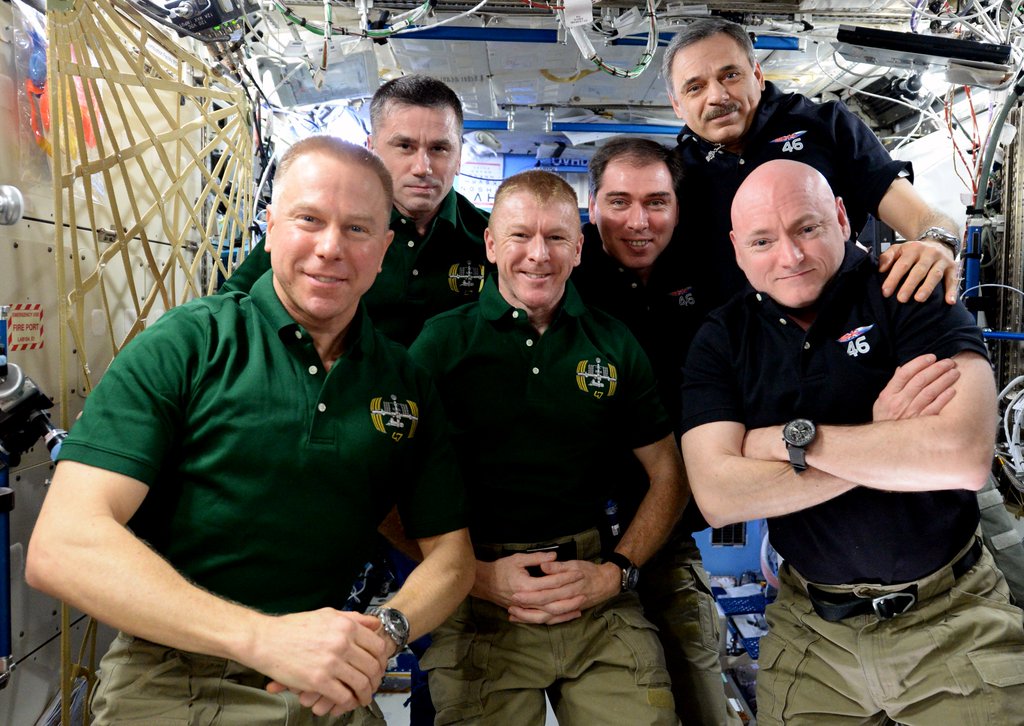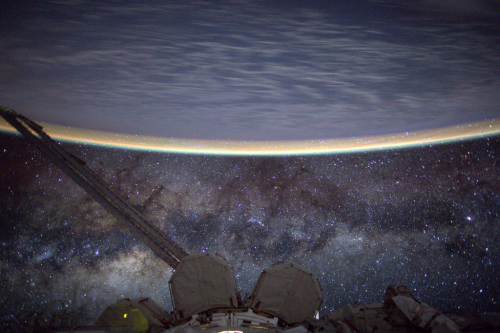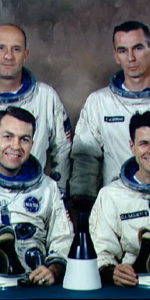With yesterday’s change of command ceremony, Expedition 47 Commander Tim Kopra (left) will lead the International Space Station (ISS) through early June. He takes over from One-Year crewman Scott Kelly (right). Photo Credit: NASA/Tim Kopra/Twitter With just one day of their (almost) year-long mission remaining, U.S. astronaut Scott Kelly and Russian cosmonaut Mikhail Kornienko—together with their Soyuz TMA-18M crewmate Sergei Volkov—officially wrapped up Expedition 46 on Monday afternoon. Kelly, who has commanded the International Space Station (ISS) since September 2015, transferred authority of the orbital outpost to fellow NASA astronaut Tim Kopra, who will lead Expedition 47 through early June. Present plans
In more than 15 years of continuous ISS expedition crew operations and Britain’s Tim Peake
“The Change of Command ceremony on the space station means a number of things,” Kelly told his terrestrial audience, in a televised broadcast Monday afternoon. “One thing it means is that some of us—the guys in the black shirts here—are going home tomorrow, which, of course, is always bittersweet, when you leave this incredible place.” For his current expedition, Kelly has spent all but about 11 hours—discounting the six-hour launch and “fast rendezvous” on 26/27 March 2015 and a short, 25-minute “hop” when his crew transferred the Soyuz TMA-16M spacecraft between docking ports, last August of the STS-118 shuttle mission in August 2007
One of Scott Kelly’s final views of Earth from space, acquired on 29 February 2016. Photo Credit: NASA/Scott Kelly/Twitter All told, that leaves Kelly with about 506 cumulative days aboard the ISS, more than any other U.S. astronaut. In fact, Kelly’s nearest U.S. rival is fellow astronaut Mike Fincke topped by world record-holder Gennadi Padalka
Since the arrival of U.S. astronaut Bill Shepherd and his Russian crewmates, Yuri Gidzenko and Sergei Krikalev, on 2 November 2000 Teamwork makes the dream work in spaceflight.’ And spaceflight is the biggest team sport there is, and it’s incredibly important that we all work together to make what is seemingly impossible, possible.”
Without further ado, Kelly passed the microphone over to Kopra, who has occupied the station as a member of Expedition 46 since mid-December bearing U.S. astronaut Jeff Williams and Russian cosmonauts Alexei Ovchinin and Oleg Skripochka
Including Expedition 1, and with Kopra’s Expedition 47 now underway, the tally stands as Russians and Americans having each commanded 22 ISS increments, with the International Partners (IPs) of the European Space Agency (ESA), the Canadian Space Agency (CSA) ,the Japan Aerospace Exploration Agency (JAXA) with fellow cosmonaut Fyodor Yurchikhin in second place on three commands Pavel Vinogradov Oleg Kotov
During his 12 months in orbit, Scott Kelly’s remarkable images have captivated the world. Photo Credit: NASA/Scott Kelly/Twitter “The decision as to who commands the station is made by the Multilateral Crew Operations Panel (MCOP) of the International Partner representatives,” NASA’s Rob Navias told AmericaSpace recently. “More often than not, the command is rotated from an American commander to a Russian commander, and vice-versa, but it is not a set rule.” He noted that “by agreement, either the U.S. or Russia will have consecutive commands.” In fact, with Kopra set to command Expedition 47 through early June, and Jeff Williams due to pick up the baton of leading Expedition 48 through September, the ISS will see an American at the helm of the station for an entire year, for the first time. Russia, by contrast, has seen its cosmonauts command the ISS continuously for ten months, from May 2013 through March 2014, during Expeditions 36-38.
In recent days, Kelly has taken to Twitter as he finally stopped “counting up” his time in space and began “counting down” through the final 10 days (and final wakeup) of his and Kornienko’s long mission. “#Countdown We’re down to a wakeup,” he told his 920,000 followers late Monday including a final image of himself at his desk, proudly displaying an “I’ll Be Back in 365 Days” placard
With their return to Earth timed for later tonight EST, Soyuz TMA-18M will alight on the desolate steppe of north-central Kazakhstan about 2.5 hours after local sunrise. And after living and working together in space for almost a year, and having trained together for more than two years prior to launch terra firma , they will have spent more than 340 days physically detached from the Home Planet and will have completed the fourth-longest single spaceflight in human history. Phrases such as “We Did It!” are near the top of their list of possible first words. However, both men are keenly aware, as Kelly explained at yesterday’s change of command ceremony, that their success was a reflection of teamwork and that they stood upon the shoulders of thousands of people around the world who put their historic mission together.
Be sure to “Like” AmericaSpace on Facebook and follow us on Twitter: @AmericaSpace
Missions »
ISS »
Missions »
ISS »
Soyuz TMA-M »
Posts associated with the ISS missions After Daylong Delay, NG-20 Cygnus Launches, Heads to Space Station
After Four-Month-Plus Stay, NG-19 Cygnus Cargo Ship Leaves Space Station
Last Antares 200-Series Rocket Launches, Delivers NG-19 Cygnus to Space Station
Northrop Grumman Prepares for Final Antares 230 Launch Tomorrow
Northrop Grumman Launches NG-18 Cygnus to Space Station, Honors Pioneer Sally Ride
NG-17 Cygnus Departs Space Station, Wraps Up Four-Month Stay
CRS-24 Dragon Launches, Heads to Space Station
NG-16 Cygnus Departs Space Station, Heads for Re-entry
NG-16 Cygnus Launches, Honors Challenger Veteran, Heads to Space Station
NG-16 Cygnus Prepares for Tuesday Launch, as OFT-2 Starliner Delay Lengthens
Next Cygnus Cargo Ship Named for Challenger Hero Ellison Onizuka
Station Crew Readies for Tuesday Cygnus Departure, NG-16 Launch NET 10 August
As CRS-22 Readies for Thursday Launch, SpaceX, AxiomSpace Plan for Four Missions Through 2023
SpaceX, ULA Primed for Five Launches in June, CRS-22 Dragon Set to Fly Thursday
Crew-2 Launches, Takes Aim on Space Station for Saturday Arrival
SpaceX Static-Fires Falcon 9 for Crew-2, As Boeing OFT-2 Mission Aims for Aug-Sept Launch
Crew-2 Astronauts Discuss Upcoming Mission, Eye 20 April Launch to ISS
Northrop Grumman Green-Lights Two More Cygnus Missions, As NG-15 Arrives at Space Station
ISS-Bound NG-15 Cygnus Honors ‘Hidden Figure’ Katherine Johnson
Multi-National Crew-2 Gears Up for 20 April Launch to Space Station
NG-14 Cygnus Departs Space Station, Two Weeks of Autonomous Fire Safety, Tech Experiments Ahead
NG-14 Cygnus Arrives at Space Station, Ahead of Expedition 64 Launch Next Week
Antares Breaks Launch Week Curse, as SpaceX Suffers Last-Second Scrub
Scrub Week Continues, Antares Launch Now NET Friday Night
Next NASA, SpaceX Crew Launch Set for Oct 31 with ‘Crew-1’
NG-14 Cygnus Readies for Tuesday Night Launch From Wallops
Next Cygnus Cargo Ship Named for Columbia Astronaut Kalpana Chawla
Second-Heaviest Cygnus, Antares Booster Processing Ramps Up for NG-14 Mission
Next Cygnus Supply Mission Targets 29 Sept Launch to Space Station
Rubins, Crewmates Discuss Upcoming Space Station Mission
Demo-2 Docks at Space Station, Expedition 63 Expands to Five Crew
T-1 Day: NASA, SpaceX Ready to Bring Human Spaceflight Back to America (Part 2)
NASA, SpaceX Ready to Return Human Spaceflight to American Soil (Part 1)
Astronauts Arrive in Florida for Launch Next Week on SpaceX Demo-2 Mission
Starlink Mission Slips to NET June; Demo-2 Next Up for SpaceX
Cygnus Departs Space Station; 2 Weeks of SAFFIRE Experiments Planned
NASA, SpaceX Preview First Crewed Dragon Mission, Set for May 27 Launch
NG-13 Cygnus Begins ISS Chase with 8,000 Pounds of Cargo for Space Station
Antares to Launch NG-13 ISS Resupply Tonight from VA, Spacecraft Named After Robert Lawrence
SpaceX Crew Dragon Inflight Abort Test Video
Antares Ready for Saturday Launch from Virginia to Resupply ISS (NG-12)
Antares to Launch NG-11 Cygnus from VA April 17, Honors Apollo 1 Hero Roger Chaffee
Crew Dragon Kicks Off Demo-1 Mission to Return Human Spaceflight to American Shores
Decade-Long Crew Dragon Program Stands Ready for Maiden Mission (Part 2)
Decade-Long Crew Dragon Program Stands Ready for Maiden Mission (Part 1)
NASA Clears SpaceX to Launch Crew Dragon ‘Demo-1’ on March 2
First Crew Dragon Demo On Track for Late-Night Launch March 2
Good Test Fire for First Crew Dragon Mission Paves Way to Launch NET Late February
Cygnus Arrives at Space Station with 7,400 Pounds of Fresh Supplies and Science
Antares Launches Ninth Cygnus Cargo Delivery Mission to Space Station
Missions »
ISS »
Soyuz TMA-M »
TMA-16M »
Posts associated with the ISS missions After Daylong Delay, NG-20 Cygnus Launches, Heads to Space Station
After Four-Month-Plus Stay, NG-19 Cygnus Cargo Ship Leaves Space Station
Last Antares 200-Series Rocket Launches, Delivers NG-19 Cygnus to Space Station
Northrop Grumman Prepares for Final Antares 230 Launch Tomorrow
Northrop Grumman Launches NG-18 Cygnus to Space Station, Honors Pioneer Sally Ride
NG-17 Cygnus Departs Space Station, Wraps Up Four-Month Stay
CRS-24 Dragon Launches, Heads to Space Station
NG-16 Cygnus Departs Space Station, Heads for Re-entry
NG-16 Cygnus Launches, Honors Challenger Veteran, Heads to Space Station
NG-16 Cygnus Prepares for Tuesday Launch, as OFT-2 Starliner Delay Lengthens
Next Cygnus Cargo Ship Named for Challenger Hero Ellison Onizuka
Station Crew Readies for Tuesday Cygnus Departure, NG-16 Launch NET 10 August
As CRS-22 Readies for Thursday Launch, SpaceX, AxiomSpace Plan for Four Missions Through 2023
SpaceX, ULA Primed for Five Launches in June, CRS-22 Dragon Set to Fly Thursday
Crew-2 Launches, Takes Aim on Space Station for Saturday Arrival
SpaceX Static-Fires Falcon 9 for Crew-2, As Boeing OFT-2 Mission Aims for Aug-Sept Launch
Crew-2 Astronauts Discuss Upcoming Mission, Eye 20 April Launch to ISS
Northrop Grumman Green-Lights Two More Cygnus Missions, As NG-15 Arrives at Space Station
ISS-Bound NG-15 Cygnus Honors ‘Hidden Figure’ Katherine Johnson
Multi-National Crew-2 Gears Up for 20 April Launch to Space Station
NG-14 Cygnus Departs Space Station, Two Weeks of Autonomous Fire Safety, Tech Experiments Ahead
NG-14 Cygnus Arrives at Space Station, Ahead of Expedition 64 Launch Next Week
Antares Breaks Launch Week Curse, as SpaceX Suffers Last-Second Scrub
Scrub Week Continues, Antares Launch Now NET Friday Night
Next NASA, SpaceX Crew Launch Set for Oct 31 with ‘Crew-1’
NG-14 Cygnus Readies for Tuesday Night Launch From Wallops
Next Cygnus Cargo Ship Named for Columbia Astronaut Kalpana Chawla
Second-Heaviest Cygnus, Antares Booster Processing Ramps Up for NG-14 Mission
Next Cygnus Supply Mission Targets 29 Sept Launch to Space Station
Rubins, Crewmates Discuss Upcoming Space Station Mission
Demo-2 Docks at Space Station, Expedition 63 Expands to Five Crew
T-1 Day: NASA, SpaceX Ready to Bring Human Spaceflight Back to America (Part 2)
NASA, SpaceX Ready to Return Human Spaceflight to American Soil (Part 1)
Astronauts Arrive in Florida for Launch Next Week on SpaceX Demo-2 Mission
Starlink Mission Slips to NET June; Demo-2 Next Up for SpaceX
Cygnus Departs Space Station; 2 Weeks of SAFFIRE Experiments Planned
NASA, SpaceX Preview First Crewed Dragon Mission, Set for May 27 Launch
NG-13 Cygnus Begins ISS Chase with 8,000 Pounds of Cargo for Space Station
Antares to Launch NG-13 ISS Resupply Tonight from VA, Spacecraft Named After Robert Lawrence
SpaceX Crew Dragon Inflight Abort Test Video
Antares Ready for Saturday Launch from Virginia to Resupply ISS (NG-12)
Antares to Launch NG-11 Cygnus from VA April 17, Honors Apollo 1 Hero Roger Chaffee
Crew Dragon Kicks Off Demo-1 Mission to Return Human Spaceflight to American Shores
Decade-Long Crew Dragon Program Stands Ready for Maiden Mission (Part 2)
Decade-Long Crew Dragon Program Stands Ready for Maiden Mission (Part 1)
NASA Clears SpaceX to Launch Crew Dragon ‘Demo-1’ on March 2
First Crew Dragon Demo On Track for Late-Night Launch March 2
Good Test Fire for First Crew Dragon Mission Paves Way to Launch NET Late February
Cygnus Arrives at Space Station with 7,400 Pounds of Fresh Supplies and Science
Antares Launches Ninth Cygnus Cargo Delivery Mission to Space Station
Posts associated with the Soyuz TMA-M missions Future Space Station Crew Discusses ISS Expedition
Multi-National Soyuz MS-01 Crew Prepares for Weekend Return to Earth
Soyuz Docking Restores Space Station to Full Crew Strength
New Crew Begins Two-Day Voyage to Space Station
Multi-National Crew to Launch to Space Station Aboard First Soyuz-MS Spacecraft
Expedition 47 Crew Returns Safely to Earth After Six-Month ISS Mission
Expedition 47 Return Extended to 18 June to Support ‘Heavy Scientific Research Work’
Jeff Williams and ‘Sardines’ Top the U.S. Spaceflight Experience Table
America’s Next Record-Breaker Rockets to Orbit for Six-Month Mission
Last Soyuz TMA-M Crew Ready for Friday Launch to Space Station
Three Spacefarers From Three Nations Discuss Four-Month Mission to Space Station
Scott Kelly Considers Journey to Mars as Doable in Post-Landing Remarks About One-Year Mission
Kelly and Kornienko’s Year-Long Mission Paves Way for Journey to Mars
Kopra Assumes Command of Expedition 47, Ahead of One-Year Crew Return to Earth
One-Year Crew Prepares to Depart Space Station for Return to Earth
Into the Homestretch: Kelly and Kornienko to Pass 300 Days in Space, Heading for 2 March Return to Earth
US and UK Spacewalkers Repair, Replace, Remove, and Install Hardware Outside Space Station
Kopra and Peake Primed for Friday Spacewalk
Three New Crew Members Talk About Upcoming Space Station Expedition
Expedition 46 Spacewalkers Secure Mobile Transporter, Ahead of Progress-MS Arrival at Space Station
Three New Crew Headed to Space Station Tomorrow Aboard Soyuz TMA-19M
‘What an Honor’: Space Station Crew Prepares for Friday Return to Earth
Expedition 45 Crew to Celebrate Thanksgiving With Turkey and Candied Yams Aboard Space Station
Expedition 45 Spacewalkers Set to Restore Troublesome P-6 Cooling System to ‘Default Setting’
First-Time Spacewalkers Complete EVA-32, Ahead of ‘Extremely Busy’ Winter of Resupply Operations
Record Breaker: Scott Kelly Becomes Most Experienced US Astronaut Tomorrow
Kelly and Kornienko Head Into Second Half of Year-Long Mission; Two US EVAs on Tap in October-November
Kelly to Become First Two-Time US Space Station Commander
Soyuz TMA-16M Crew Prepares for Spacecraft Switch, Ahead of Soyuz TMA-18M Arrival
Soyuz TMA-17M Crew Rockets to Orbit, Bound for Five Months Aboard Space Station – UPDATE
All-Civilian Soyuz TMA-17M Crew Ready for Wednesday Launch to Space Station (Part 2)
All-Civilian Soyuz TMA-17M Crew Ready for Wednesday Launch to Space Station (Part 1)
After 28 Weeks in Orbit, Multi-National Soyuz TMA-15M Crew Returns Safely to Earth
Second-Longest Space Station Expedition to End Thursday
NASA, ESA Confirm Soyuz TMA-15M Landing Delay; Sarah Brightman Postpones Mission
Cristoforetti Set for Endurance Record, as Expedition 43 Return Reportedly Delayed to Mid-June
New Crew Settles In While Ongoing Research Continues for Expedition 43 on ISS
Scott Kelly Describes Return to Space Station as ‘Coming to My Old Home’
One-Year Mission Underway With Rousing Soyuz TMA-16M Launch
Ambitious One-Year Mission Counting Down to Friday Launch (Part 2)
Identical Twin, Former Paratrooper, and Ecologist to Launch Friday Aboard Soyuz TMA-16M (Part 1)
‘Off On the Right Foot’: Expedition 43 Underway at Space Station
Soyuz TMA-14M Crew Returns to Earth After 167-Day Mission
Soyuz TMA-14M Crew to Depart Space Station Wednesday After 5.5-Month Mission
Hardware Movement and Reconfiguration to Highlight Space Station Operations in 2015 (Part 2)
Hardware Movement and Reconfiguration to Highlight Space Station Operations in 2015 (Part 1)
‘For the Long Haul’: NASA and International Partners Ready for Record-Setting 2015 Aboard Space Station
Newton’s Apple and Soyuz Rocket Grace Tim Peake’s ‘Principia’ Mission Patch
New Crew Settles In Aboard Space Station, Ready for Six-Month Mission
Soyuz TMA-15M Rockets to Orbit to Complete Expedition 42
Missions »
ISS »
Soyuz TMA-M »
TMA-19M »
Posts associated with the ISS missions After Daylong Delay, NG-20 Cygnus Launches, Heads to Space Station
After Four-Month-Plus Stay, NG-19 Cygnus Cargo Ship Leaves Space Station
Last Antares 200-Series Rocket Launches, Delivers NG-19 Cygnus to Space Station
Northrop Grumman Prepares for Final Antares 230 Launch Tomorrow
Northrop Grumman Launches NG-18 Cygnus to Space Station, Honors Pioneer Sally Ride
NG-17 Cygnus Departs Space Station, Wraps Up Four-Month Stay
CRS-24 Dragon Launches, Heads to Space Station
NG-16 Cygnus Departs Space Station, Heads for Re-entry
NG-16 Cygnus Launches, Honors Challenger Veteran, Heads to Space Station
NG-16 Cygnus Prepares for Tuesday Launch, as OFT-2 Starliner Delay Lengthens
Next Cygnus Cargo Ship Named for Challenger Hero Ellison Onizuka
Station Crew Readies for Tuesday Cygnus Departure, NG-16 Launch NET 10 August
As CRS-22 Readies for Thursday Launch, SpaceX, AxiomSpace Plan for Four Missions Through 2023
SpaceX, ULA Primed for Five Launches in June, CRS-22 Dragon Set to Fly Thursday
Crew-2 Launches, Takes Aim on Space Station for Saturday Arrival
SpaceX Static-Fires Falcon 9 for Crew-2, As Boeing OFT-2 Mission Aims for Aug-Sept Launch
Crew-2 Astronauts Discuss Upcoming Mission, Eye 20 April Launch to ISS
Northrop Grumman Green-Lights Two More Cygnus Missions, As NG-15 Arrives at Space Station
ISS-Bound NG-15 Cygnus Honors ‘Hidden Figure’ Katherine Johnson
Multi-National Crew-2 Gears Up for 20 April Launch to Space Station
NG-14 Cygnus Departs Space Station, Two Weeks of Autonomous Fire Safety, Tech Experiments Ahead
NG-14 Cygnus Arrives at Space Station, Ahead of Expedition 64 Launch Next Week
Antares Breaks Launch Week Curse, as SpaceX Suffers Last-Second Scrub
Scrub Week Continues, Antares Launch Now NET Friday Night
Next NASA, SpaceX Crew Launch Set for Oct 31 with ‘Crew-1’
NG-14 Cygnus Readies for Tuesday Night Launch From Wallops
Next Cygnus Cargo Ship Named for Columbia Astronaut Kalpana Chawla
Second-Heaviest Cygnus, Antares Booster Processing Ramps Up for NG-14 Mission
Next Cygnus Supply Mission Targets 29 Sept Launch to Space Station
Rubins, Crewmates Discuss Upcoming Space Station Mission
Demo-2 Docks at Space Station, Expedition 63 Expands to Five Crew
T-1 Day: NASA, SpaceX Ready to Bring Human Spaceflight Back to America (Part 2)
NASA, SpaceX Ready to Return Human Spaceflight to American Soil (Part 1)
Astronauts Arrive in Florida for Launch Next Week on SpaceX Demo-2 Mission
Starlink Mission Slips to NET June; Demo-2 Next Up for SpaceX
Cygnus Departs Space Station; 2 Weeks of SAFFIRE Experiments Planned
NASA, SpaceX Preview First Crewed Dragon Mission, Set for May 27 Launch
NG-13 Cygnus Begins ISS Chase with 8,000 Pounds of Cargo for Space Station
Antares to Launch NG-13 ISS Resupply Tonight from VA, Spacecraft Named After Robert Lawrence
SpaceX Crew Dragon Inflight Abort Test Video
Antares Ready for Saturday Launch from Virginia to Resupply ISS (NG-12)
Antares to Launch NG-11 Cygnus from VA April 17, Honors Apollo 1 Hero Roger Chaffee
Crew Dragon Kicks Off Demo-1 Mission to Return Human Spaceflight to American Shores
Decade-Long Crew Dragon Program Stands Ready for Maiden Mission (Part 2)
Decade-Long Crew Dragon Program Stands Ready for Maiden Mission (Part 1)
NASA Clears SpaceX to Launch Crew Dragon ‘Demo-1’ on March 2
First Crew Dragon Demo On Track for Late-Night Launch March 2
Good Test Fire for First Crew Dragon Mission Paves Way to Launch NET Late February
Cygnus Arrives at Space Station with 7,400 Pounds of Fresh Supplies and Science
Antares Launches Ninth Cygnus Cargo Delivery Mission to Space Station
Posts associated with the Soyuz TMA-M missions Future Space Station Crew Discusses ISS Expedition
Multi-National Soyuz MS-01 Crew Prepares for Weekend Return to Earth
Soyuz Docking Restores Space Station to Full Crew Strength
New Crew Begins Two-Day Voyage to Space Station
Multi-National Crew to Launch to Space Station Aboard First Soyuz-MS Spacecraft
Expedition 47 Crew Returns Safely to Earth After Six-Month ISS Mission
Expedition 47 Return Extended to 18 June to Support ‘Heavy Scientific Research Work’
Jeff Williams and ‘Sardines’ Top the U.S. Spaceflight Experience Table
America’s Next Record-Breaker Rockets to Orbit for Six-Month Mission
Last Soyuz TMA-M Crew Ready for Friday Launch to Space Station
Three Spacefarers From Three Nations Discuss Four-Month Mission to Space Station
Scott Kelly Considers Journey to Mars as Doable in Post-Landing Remarks About One-Year Mission
Kelly and Kornienko’s Year-Long Mission Paves Way for Journey to Mars
Kopra Assumes Command of Expedition 47, Ahead of One-Year Crew Return to Earth
One-Year Crew Prepares to Depart Space Station for Return to Earth
Into the Homestretch: Kelly and Kornienko to Pass 300 Days in Space, Heading for 2 March Return to Earth
US and UK Spacewalkers Repair, Replace, Remove, and Install Hardware Outside Space Station
Kopra and Peake Primed for Friday Spacewalk
Three New Crew Members Talk About Upcoming Space Station Expedition
Expedition 46 Spacewalkers Secure Mobile Transporter, Ahead of Progress-MS Arrival at Space Station
Three New Crew Headed to Space Station Tomorrow Aboard Soyuz TMA-19M
‘What an Honor’: Space Station Crew Prepares for Friday Return to Earth
Expedition 45 Crew to Celebrate Thanksgiving With Turkey and Candied Yams Aboard Space Station
Expedition 45 Spacewalkers Set to Restore Troublesome P-6 Cooling System to ‘Default Setting’
First-Time Spacewalkers Complete EVA-32, Ahead of ‘Extremely Busy’ Winter of Resupply Operations
Record Breaker: Scott Kelly Becomes Most Experienced US Astronaut Tomorrow
Kelly and Kornienko Head Into Second Half of Year-Long Mission; Two US EVAs on Tap in October-November
Kelly to Become First Two-Time US Space Station Commander
Soyuz TMA-16M Crew Prepares for Spacecraft Switch, Ahead of Soyuz TMA-18M Arrival
Soyuz TMA-17M Crew Rockets to Orbit, Bound for Five Months Aboard Space Station – UPDATE
All-Civilian Soyuz TMA-17M Crew Ready for Wednesday Launch to Space Station (Part 2)
All-Civilian Soyuz TMA-17M Crew Ready for Wednesday Launch to Space Station (Part 1)
After 28 Weeks in Orbit, Multi-National Soyuz TMA-15M Crew Returns Safely to Earth
Second-Longest Space Station Expedition to End Thursday
NASA, ESA Confirm Soyuz TMA-15M Landing Delay; Sarah Brightman Postpones Mission
Cristoforetti Set for Endurance Record, as Expedition 43 Return Reportedly Delayed to Mid-June
New Crew Settles In While Ongoing Research Continues for Expedition 43 on ISS
Scott Kelly Describes Return to Space Station as ‘Coming to My Old Home’
One-Year Mission Underway With Rousing Soyuz TMA-16M Launch
Ambitious One-Year Mission Counting Down to Friday Launch (Part 2)
Identical Twin, Former Paratrooper, and Ecologist to Launch Friday Aboard Soyuz TMA-16M (Part 1)
‘Off On the Right Foot’: Expedition 43 Underway at Space Station
Soyuz TMA-14M Crew Returns to Earth After 167-Day Mission
Soyuz TMA-14M Crew to Depart Space Station Wednesday After 5.5-Month Mission
Hardware Movement and Reconfiguration to Highlight Space Station Operations in 2015 (Part 2)
Hardware Movement and Reconfiguration to Highlight Space Station Operations in 2015 (Part 1)
‘For the Long Haul’: NASA and International Partners Ready for Record-Setting 2015 Aboard Space Station
Newton’s Apple and Soyuz Rocket Grace Tim Peake’s ‘Principia’ Mission Patch
New Crew Settles In Aboard Space Station, Ready for Six-Month Mission
Soyuz TMA-15M Rockets to Orbit to Complete Expedition 42
Missions »
ISS »
Soyuz TMA-M »
TMA-20M »
Posts associated with the ISS missions After Daylong Delay, NG-20 Cygnus Launches, Heads to Space Station
After Four-Month-Plus Stay, NG-19 Cygnus Cargo Ship Leaves Space Station
Last Antares 200-Series Rocket Launches, Delivers NG-19 Cygnus to Space Station
Northrop Grumman Prepares for Final Antares 230 Launch Tomorrow
Northrop Grumman Launches NG-18 Cygnus to Space Station, Honors Pioneer Sally Ride
NG-17 Cygnus Departs Space Station, Wraps Up Four-Month Stay
CRS-24 Dragon Launches, Heads to Space Station
NG-16 Cygnus Departs Space Station, Heads for Re-entry
NG-16 Cygnus Launches, Honors Challenger Veteran, Heads to Space Station
NG-16 Cygnus Prepares for Tuesday Launch, as OFT-2 Starliner Delay Lengthens
Next Cygnus Cargo Ship Named for Challenger Hero Ellison Onizuka
Station Crew Readies for Tuesday Cygnus Departure, NG-16 Launch NET 10 August
As CRS-22 Readies for Thursday Launch, SpaceX, AxiomSpace Plan for Four Missions Through 2023
SpaceX, ULA Primed for Five Launches in June, CRS-22 Dragon Set to Fly Thursday
Crew-2 Launches, Takes Aim on Space Station for Saturday Arrival
SpaceX Static-Fires Falcon 9 for Crew-2, As Boeing OFT-2 Mission Aims for Aug-Sept Launch
Crew-2 Astronauts Discuss Upcoming Mission, Eye 20 April Launch to ISS
Northrop Grumman Green-Lights Two More Cygnus Missions, As NG-15 Arrives at Space Station
ISS-Bound NG-15 Cygnus Honors ‘Hidden Figure’ Katherine Johnson
Multi-National Crew-2 Gears Up for 20 April Launch to Space Station
NG-14 Cygnus Departs Space Station, Two Weeks of Autonomous Fire Safety, Tech Experiments Ahead
NG-14 Cygnus Arrives at Space Station, Ahead of Expedition 64 Launch Next Week
Antares Breaks Launch Week Curse, as SpaceX Suffers Last-Second Scrub
Scrub Week Continues, Antares Launch Now NET Friday Night
Next NASA, SpaceX Crew Launch Set for Oct 31 with ‘Crew-1’
NG-14 Cygnus Readies for Tuesday Night Launch From Wallops
Next Cygnus Cargo Ship Named for Columbia Astronaut Kalpana Chawla
Second-Heaviest Cygnus, Antares Booster Processing Ramps Up for NG-14 Mission
Next Cygnus Supply Mission Targets 29 Sept Launch to Space Station
Rubins, Crewmates Discuss Upcoming Space Station Mission
Demo-2 Docks at Space Station, Expedition 63 Expands to Five Crew
T-1 Day: NASA, SpaceX Ready to Bring Human Spaceflight Back to America (Part 2)
NASA, SpaceX Ready to Return Human Spaceflight to American Soil (Part 1)
Astronauts Arrive in Florida for Launch Next Week on SpaceX Demo-2 Mission
Starlink Mission Slips to NET June; Demo-2 Next Up for SpaceX
Cygnus Departs Space Station; 2 Weeks of SAFFIRE Experiments Planned
NASA, SpaceX Preview First Crewed Dragon Mission, Set for May 27 Launch
NG-13 Cygnus Begins ISS Chase with 8,000 Pounds of Cargo for Space Station
Antares to Launch NG-13 ISS Resupply Tonight from VA, Spacecraft Named After Robert Lawrence
SpaceX Crew Dragon Inflight Abort Test Video
Antares Ready for Saturday Launch from Virginia to Resupply ISS (NG-12)
Antares to Launch NG-11 Cygnus from VA April 17, Honors Apollo 1 Hero Roger Chaffee
Crew Dragon Kicks Off Demo-1 Mission to Return Human Spaceflight to American Shores
Decade-Long Crew Dragon Program Stands Ready for Maiden Mission (Part 2)
Decade-Long Crew Dragon Program Stands Ready for Maiden Mission (Part 1)
NASA Clears SpaceX to Launch Crew Dragon ‘Demo-1’ on March 2
First Crew Dragon Demo On Track for Late-Night Launch March 2
Good Test Fire for First Crew Dragon Mission Paves Way to Launch NET Late February
Cygnus Arrives at Space Station with 7,400 Pounds of Fresh Supplies and Science
Antares Launches Ninth Cygnus Cargo Delivery Mission to Space Station
Posts associated with the Soyuz TMA-M missions Future Space Station Crew Discusses ISS Expedition
Multi-National Soyuz MS-01 Crew Prepares for Weekend Return to Earth
Soyuz Docking Restores Space Station to Full Crew Strength
New Crew Begins Two-Day Voyage to Space Station
Multi-National Crew to Launch to Space Station Aboard First Soyuz-MS Spacecraft
Expedition 47 Crew Returns Safely to Earth After Six-Month ISS Mission
Expedition 47 Return Extended to 18 June to Support ‘Heavy Scientific Research Work’
Jeff Williams and ‘Sardines’ Top the U.S. Spaceflight Experience Table
America’s Next Record-Breaker Rockets to Orbit for Six-Month Mission
Last Soyuz TMA-M Crew Ready for Friday Launch to Space Station
Three Spacefarers From Three Nations Discuss Four-Month Mission to Space Station
Scott Kelly Considers Journey to Mars as Doable in Post-Landing Remarks About One-Year Mission
Kelly and Kornienko’s Year-Long Mission Paves Way for Journey to Mars
Kopra Assumes Command of Expedition 47, Ahead of One-Year Crew Return to Earth
One-Year Crew Prepares to Depart Space Station for Return to Earth
Into the Homestretch: Kelly and Kornienko to Pass 300 Days in Space, Heading for 2 March Return to Earth
US and UK Spacewalkers Repair, Replace, Remove, and Install Hardware Outside Space Station
Kopra and Peake Primed for Friday Spacewalk
Three New Crew Members Talk About Upcoming Space Station Expedition
Expedition 46 Spacewalkers Secure Mobile Transporter, Ahead of Progress-MS Arrival at Space Station
Three New Crew Headed to Space Station Tomorrow Aboard Soyuz TMA-19M
‘What an Honor’: Space Station Crew Prepares for Friday Return to Earth
Expedition 45 Crew to Celebrate Thanksgiving With Turkey and Candied Yams Aboard Space Station
Expedition 45 Spacewalkers Set to Restore Troublesome P-6 Cooling System to ‘Default Setting’
First-Time Spacewalkers Complete EVA-32, Ahead of ‘Extremely Busy’ Winter of Resupply Operations
Record Breaker: Scott Kelly Becomes Most Experienced US Astronaut Tomorrow
Kelly and Kornienko Head Into Second Half of Year-Long Mission; Two US EVAs on Tap in October-November
Kelly to Become First Two-Time US Space Station Commander
Soyuz TMA-16M Crew Prepares for Spacecraft Switch, Ahead of Soyuz TMA-18M Arrival
Soyuz TMA-17M Crew Rockets to Orbit, Bound for Five Months Aboard Space Station – UPDATE
All-Civilian Soyuz TMA-17M Crew Ready for Wednesday Launch to Space Station (Part 2)
All-Civilian Soyuz TMA-17M Crew Ready for Wednesday Launch to Space Station (Part 1)
After 28 Weeks in Orbit, Multi-National Soyuz TMA-15M Crew Returns Safely to Earth
Second-Longest Space Station Expedition to End Thursday
NASA, ESA Confirm Soyuz TMA-15M Landing Delay; Sarah Brightman Postpones Mission
Cristoforetti Set for Endurance Record, as Expedition 43 Return Reportedly Delayed to Mid-June
New Crew Settles In While Ongoing Research Continues for Expedition 43 on ISS
Scott Kelly Describes Return to Space Station as ‘Coming to My Old Home’
One-Year Mission Underway With Rousing Soyuz TMA-16M Launch
Ambitious One-Year Mission Counting Down to Friday Launch (Part 2)
Identical Twin, Former Paratrooper, and Ecologist to Launch Friday Aboard Soyuz TMA-16M (Part 1)
‘Off On the Right Foot’: Expedition 43 Underway at Space Station
Soyuz TMA-14M Crew Returns to Earth After 167-Day Mission
Soyuz TMA-14M Crew to Depart Space Station Wednesday After 5.5-Month Mission
Hardware Movement and Reconfiguration to Highlight Space Station Operations in 2015 (Part 2)
Hardware Movement and Reconfiguration to Highlight Space Station Operations in 2015 (Part 1)
‘For the Long Haul’: NASA and International Partners Ready for Record-Setting 2015 Aboard Space Station
Newton’s Apple and Soyuz Rocket Grace Tim Peake’s ‘Principia’ Mission Patch
New Crew Settles In Aboard Space Station, Ready for Six-Month Mission
Soyuz TMA-15M Rockets to Orbit to Complete Expedition 42
Like this: Like Loading...









11 month crew return.